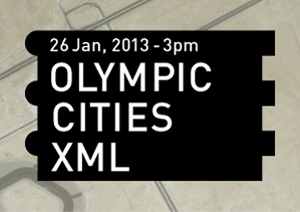26 January: Opening Exhibition ‘Olympic Cities’

Today, the Olympic Games are the biggest mega-event in the world. To analyse the phenomenon of mega-event urbanism, Dutch architecture office XML did a comparative study on Olympic candidatures. The results of their work will now be on show at the gallery of the HKU/Shanghai Study Centre. The exhibition opens 26 January, 4.30pm.
The Olympic Games are probably the biggest of a number of mega-events – such as the World Expo, the World Cup Football or Asia Games – that over the last twenty years have had a growing impact on the development of cities, especially in emerging economies. To understand this impact of mega-events as the driver of large-scale urban developments, the Dutch architecture office XML did a comparative analysis of future Olympic bids. The research compares six cities with an Olympic ambition – Tokyo (2020), Doha (2020), Istanbul (2020), Madrid (2020), Durban (2024) and Capetown (2024) – and investigates how these cities use the Games for the long-term development of their city. Therefore, the research not only presents an overview of Olympic plans but also reveals respective attempts to create a future vision on urban societies. The exhibition shows how these societies try to deal with current, and future trends by using their Olympic aspirations as a particular way of looking at the cultural, economic, spatial and political developments in the analysed cities.
‘The research gives an extraordinary insight into the urban and social impact of the mega-event,’ says HKU/SSC-curator Daan Roggeveen. ‘This exhibition is on show only six months before the IOC will elect the 2020 host city.’ A series of maps outline the planned (Olympic) developments of six ‘Olympic Cities’. Diagrams and short introductions reveil the motivations and main principles of the Olympic projects of each city.
As part of the project, XML invited local ‘correspondents’ in each city to participate. These architects contributed to the project through short videos, documenting personal stories about their city and its Olympic aspirations. These video messages are part of the exhibition.
In their research, XML shows that the Olympics are not a neutral autonomous, immutable event. Olympic history points to cycles of twenty years, in which the Games are closely linked to political, economic and social developments. Each period has a specific paradigm that defines the meaning of the Games and their significance for the times. Based on long-term developments such as transformations in media technology, geopolitical shifts and the rise of urban regions, it is highly probable that the 2028 Games will coincide with the start of a new cycle. As part of the exhibition XML proposes, fuelled by these long-term developments, three scenarios that speculate on the future Games by reconnecting the Games to their intrinsic transformative potential.
XML takes a particular forward-looking approach in how their own projects address current trends and long-term developments. As an ‘epilogue’ to the exhibition, XML shows some of its recent work under the overarching title ‘Speculative Realities’,
The exhibition will open on Saturday 26 January, 4.30pm.
Prior to the opening, a seminar titled ‘Mega-event Urbanism’ will introduce the subject of the mega-event and its spatial and social consequences. Speakers include XML’s principles, Shanghai-based architect Liu Yuyang (ALYA) and others. The seminar will start at 3pm.
Venue : Gallery HKU/Shanghai Study Centre
Address : 298 Bei Suzhou Lu, Hongkou, Shanghai
Seminar : 26 January 2013, 3pm
Opening : 26 January 2013, 4.30pm
This exhibition is made possible with the generous support of the Dutch Ministry of Infrastructure & the Environment
展览:“奥运之城”–盛会城市化研究
时至今日,奥运会已经成为世界规模最大的体育盛会。为研究国际盛会为城市发展带来的影响,荷兰建筑事务所XML对申奥城市做了全面的对比研究。其研究成果将在香港大学上海学习中心展出。
展览开幕时间1月26日下午4.30。
奥运会或许是当今全球最大的盛会,其它盛会如世博会、世界杯、亚运会等在过去二十年对举办城市的影响逐渐递增,尤其是对当地经济实力的影响。为了研究国际盛会对于大规模城市发展的驱动作用,荷兰建筑事务所XML对未来申奥城市进行对比研究。这项研究对比了心怀奥运梦想的6大城市的申奥计划以及它们如何运用申奥契机牵动城市长远发展,这些城市包括:东京(2020年)、多哈(2020年)、伊斯坦布尔(2020年)、马德里(2020年)、德班(2024年)以及开普敦(2024年)。
本项研究不仅展示了这些城市的申奥计划更揭示其对未来城市发展的美好愿景。展览将呈现这些城市如何应对当前状况并透过奥运会的视角重新看待文化、经济、城市空间发展以及政治决策的制定。
香港大学上海学习中心策展人Daan Roggeveen 提到:“这项研究展示了盛会效应对于城市与社会发展的独特观点”。“再过6个月国际奥委会将公布2020年奥运会的举办城市”。“展览将展出6大城市的申奥规划蓝图”。更多图文信息对其申奥动机和申奥主题进行详细解析。
作为研究项目的一部分,XML事务所邀请来自申奥城市的特派员参加,这些特派员建筑师通过短片、个人与城市的故事和其奥利匹克梦想使本次研究更加生动。观众可以在本次展览上观赏到部分短片。
在XML的研究中,奥运会不是一个中立且从不改变的事件。其历史指向一个二十年的周期,这其中牵涉到诸多政治、经济和社会因素。每个时期都有一个特定范式来定义奥运会的特殊意义。基于媒体技术、地缘政治力量转换、地区崛起等因素带来的影响,2028年奥运会很有可能是一个新周期的开始。在这些长线发展趋势的背景下,XML事务所的研究透过盛会及其本质多变的特性提出了对未来奥运会的三种推测也将在本次展览中展出。
XML采取前瞻性的视角来看待与解读其目前的项目和长远发展。最为展览后记,XML事务所将近期作品在“思辨与现实”单元展出。
展览开幕时间:1月26日周六下午4点半
展览开幕前将举办“盛会城市化”讲座对大型盛会对空间社会发展的影响这一主题展开讨论。来自XML事务所的建筑师和驻上海建筑师刘宇扬和来自东南大学建筑学院的董卫教授将参与这场讨论。
讲座时间:1月26日周六下午3点
展览及讲座地点 : 香港大学上海学习中心
地址 : 虹口区北苏州路298号,近四川北路
讲座 : 1月26日下午三点
开幕 : 1月26日下午四点半